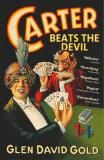Carter Beats the Devil by Glen David Gold
2001 - Sceptre paperback - 562 pages
Charles Carter, dubbed Carter the Great by Houdini himself, was born into privilege but became a magician out of need: only when dazzling an audience can he defeat his fear of loneliness. But in 1920s America the stakes are growing higher, as technology and the cinema challenge the allure of magic and Carter's stunts become increasingly audacious. Until the night President Harding takes part in Carter's act only to die two hours later, and Carter finds himself pursued not only by the Secret Service but by a host of others desperate for the terrible secret they believe Harding confided in him.
Seamlessly blending reality and fiction, Gold lays before us a glittering and romantic panorama of our modern world at a point of irrevocable change.
I liked:
The way the story begins, with Carter on the run suspected of murder when President Harding dies just hours after attending one of Carter's shows. It's a great opening.
The plot: it's a tangled web of half-truths and misdirection, constantly pulling the rug out from beneath you. There's as much illusion here as in one of Carter's magic shows.
The pacing. There was never a point where I grew tired of it.
Gold's writing style: it's simple but incredibly effective, not showy or too clever for its own good. I wasn't diving for a dictionary or thesaurus at any point.
I didn't realise until after starting the book that Charles Carter was a real-life magician, although this is a completely fictionalised account of his life. It's just so brilliantly done, with lots of other real people - from presidents to inventors to Houdini himself - weaving in and out of the story without even the slightest hiccup.
Gold's characterisation is quite subtle, done with a light touch. I felt that I got to know these people without really being aware of it, through small mannerisms and rituals that they go through, and through the wonderful dialogue, which really crackles at times (especially between Carter and a particular woman - who I won't name so as not to spoil - which gives her the feel of a truly memorable femme fatale).
The ending. It's just about perfect.
I disliked:
The cover - it does the book no favours whatsoever.
This book was never quite what I expected it to be. I lost myself completely within its world of vaudeville in the early 20th century, and was thrilled by Gold's ability to surprise and confound. It never got bogged down, never lost its impetus, and left me wanting more. In the end it is, I think, a tale about redemption, and Gold carries it off beautifully. It's quite astonishing for a debut novel, I think. I've been curious about it for some time (thanks to Kay!) and had nearly bought it on a couple of occasions. Thankfully I didn't, as it's turned out to be a brilliant birthday present. Thanks Sari, I loved it. In fact, I thought it was magic
Memorable Quotes? Loads, but I didn't want to stop reading and put the book down to make a note of them
ETA: And can I just add that Wil Wheaton also loved it



